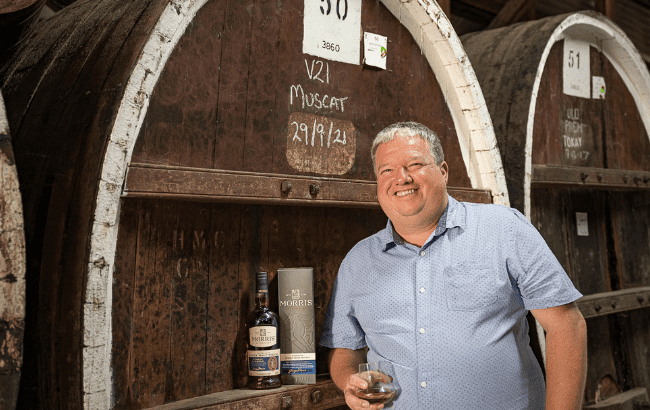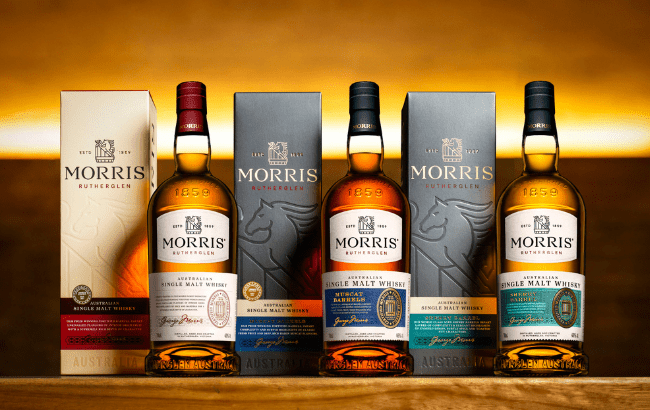SB meets… Darren Peck, Morris Whisky
The head distiller for single malt brand Morris tells us about how he travelled the world making alcohol before settling in Australia to make whisky in fortified wine barrels.

Hailing from Yorkshire in the UK, Darren Peck became part of the renowned Morris winery in Rutherglen, Australia, where he eventually shaped the company’s debut whisky brand, Morris. Working alongside fifth-generation chief winemaker David Morris, Peck uses a combination of French and American oak wine barrels sourced from family-owned wineries in the Barossa and Coonawarra regions of South Australia.
At the heart of Morris’s whisky distillation process is the original still installed at the winery in the early 1930s, when it was used for producing base spirits for Morris fortified wines.
The single malt brand has since expanded into the UK, the US, Canada, New Zealand and Taiwan (its biggest market). It is about to launch in France and Germany, where it will be exhibiting at Bar Convent Berlin next month.
How did you get into the industry?
I was studying biology and environmental science in the UK in the 90s. I then did a postgraduate degree in brewing and distilling at Heriot-Watt University and graduated as a distiller. I was lucky enough to get a job in the cider industry, working in Hereford. I was actually picked up by Diageo and moved over to Ireland, where I started to get involved in a few spirits projects. I was lucky enough to be sent over to the US, where I worked on spirits, as well as in South America. From there I moved back to Ireland, and took a job with a Dutch company. I spent three to four years troubleshooting distilleries and breweries in both Africa and Asia, and most of Eastern Europe. I got to travel the world making alcohol, which was fabulous.
In 2012, I was offered a job doing new products. By that point I had worked on every alcohol apart from Tequila and wine. When I looked at a map of the world, I realised there were only two continents that I’ve not made alcohol: Australia and Antarctica. So I took the job [at Casella Family Brands in Australia]. I was working in the business doing product development. We were interested in spirits; the business owners had always been passionate about spirits and we started to look for a way to make them. We were fortunate enough in 2016 to purchase the Morris winery. Not only did we find this fabulous array of [wine] barrels, but we also found the [original on-site] still so part of my job was to help recommission that and get the distilling side running. And from there I stayed on as the distiller in that project.
When did you start making whisky?
The distillery started up in 2016. The whisky launched about four years ago now. We had an expert down, [the late] Jim Swan, and we looked at an STR [shaved, toasted, recharred] programme, which we worked on together in 2017. We started laying down plenty of barrels by then.
Can you tell me about the whisky you produce?
We’re very, very lucky we have our own wash production, so we have our own family-owned brewery, which makes the wash, and our own wineries for the barrels. We did a signature Muscat-finished whisky to start with. The reason was that it is very, very approachable; I make a whisky that is easy to drink. We wanted to make it approachable at price point, as alcohol can be quite expensive in Australia, especially Australian whisky. We wanted to make a full-sized bottle below AU$100 which we did. The Muscat came because of all the fortified wine barrels we have – some of the greatest wines we produce is Muscat; we’re world famous for it. Dave Morris, the winemaker I work with regularly, is probably the best winemaker in the world. Muscat has a real Christmas cake flavour that complements the whisky nicely. We’re also playing with grains and other barrel finishes as well. I also like working on the smokier finishes.
Would you look at using other wine barrels to finish the whisky besides fortified wine?
I am experimenting with some other wine — red wines and other styles. One of the things I have to balance though, is that tannin take-up from the wood. So you’ve got tannin from the wood itself, as well as the natural tannins in the wine, which is soaked into the wood.

Are you considering launching other spirits?
I would never say never. We were very fortunate being part of the wine business meant that we didn’t have to put any of my spirits aside to go into something which was more of a cash stream such as gin or other spirits. That said, there are some fantastic gins out there. I’d love to play with a really good gin or play around with other spirits. Whisky was where we started and we were fortunate that we could concentrate on it. But now that we have built that up, I will say yes, I’m definitely looking to explore other areas of the business.
What about the current regulations on Australian whisky, are they too restrictive or too loose?
My opinion is that at the moment, there isn’t that many regulations in Australia, a lot were based around the 1901 law. It was an interesting year as it’s the year of Federation. So before 1901, Australia did not exist, it was six different colonies. Those colonies came together into Australia in 1901, a lot of the laws were absorbed straight from British law. That’s not really changed.
So the basic rule is it has to be matured for two years. But we don’t want to go as far as the Scots or the Americans where they get too prescriptive, and especially things like Bourbon, where you’ve got to use new oak every time. But there also needs to be some understanding to protect consumers. So there’s no real definition of single malt and how it’s produced. There should be at least labelling laws around so consumers aren’t deceived. But we don’t want too much prescription either. So you don’t want to to have to make it from this or that barley. In our climate where you can have a bad harvest as well as good harvest, it’s a disaster waiting to happen. But I do believe there needs to be a tighter emphasis on what is in the bottle so the consumer knows what they are getting.
The trade body, Australian Distillers Association, has been discussing this for a while. Obviously, whether it gets into legislation is the next step, but they are looking more at consumer protection.
How are you dealing with the country’s high spirits tax?
It is absolutely crazy tax. We pay now over AU$100 in duty, which is the third-highest [spirits tax] in the world. We’ve got to look at cost and look at the whiskies I’m developing – I want them to be the best they can be. We concentrate on giving the absolute best quality in the bottle so that the price is offset from a consumer point of view by the quality they’re getting. But obviously, we’re very careful with ingredients, we do everything we can to make ourselves as efficient as possible so that we can actually afford to pay the tax and give a quality product.
Are you looking at expanding your production capacity? Do you have enough space to meet demand?
We’ve got everything in-house. So we’ve got all the barrels we need, and we can build those efficiencies. We’re in the middle of a massive project to build new pot stills alongside our two original stills, so we’ve got stills built in 1933, which were installed in 1941. These will continue to be used for the spirit. We’re also putting in wash stills.
How are you looking at ways to make production more sustainable?
Part of the expansion is that every time we build a new building, or we look at where we’re going to put something new, we consider whether it’s suitable for solar panels, especially in Australia, where solar is reliable, we get a little bit more sun than I used to do back home [in the UK]. We look at how we can reuse water. So our waste water is collected, it’s treated on site, and is reclaimed for irrigation. And obviously, we look at the transport costs – I’ve tried to keep things local so that we’re minimising that footprint as well.
Related news
Golf drives Glen Moray push in UK travel retail
